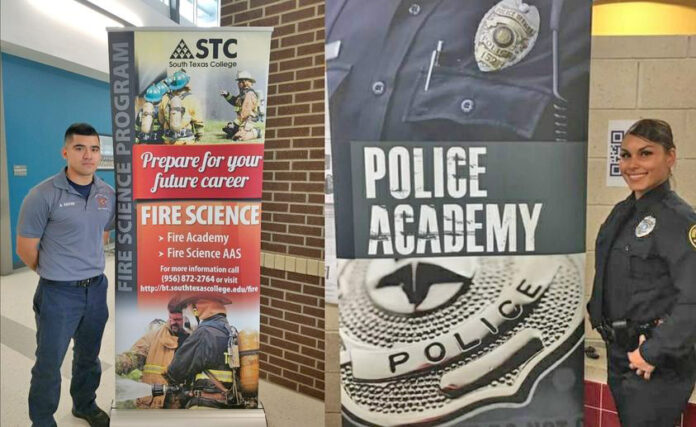Growing up in Pharr, Agustus Zuniga always wanted to be a police officer.
He saw it as a way to help others, to do something honorable — and in July, he took a big step toward that goal and enrolled in South Texas College’s police academy.
“What attracted me to the program was the really high expectations from the academy,” Zuniga, 27, said. “I wanted to be sure that I finished the top of my class and went above and beyond in this field, because of the desire that I have to help others. I want to make a difference out there in the field.”
Zuniga’s one of many students being taught under the umbrella of STC’s Regional Center for Public Safety Excellence, which is practically bursting at the seams with new students despite a significant drop in enrollment across the college as a whole.
The college is currently running four police academies, where Zuniga and 47 other students are practicing with state-of-the-art driving simulators and combing through penal code manuals to achieve their basic peace officer certificate.
STC has hired three additional adjunct instructors this semester to handle increased classes and sections for students seeking their associate degree in law enforcement, and is currently conducting its largest fire academy class in at least 10 years.
Some of the students are raw recruits looking for a pathway to a first-time first responder job, law enforcement department chair Robert Vela said. Others are veteran officers, he says, seeking higher education after years on the job.
Vela attributes the increase in part to intensified recruitment efforts at the college and to a partnership that allows law enforcement professionals to convert academy training into college credit.
He also attributes it to the challenges posed by a particularly tumultuous year, challenges that seem to be inspiring people to face them.
“With the COVID crisis going on, we have a lot of people coming in that want to do their part to help others,” he said. “So a lot of the cadets that we have coming into the program, whether it’s police or fire, it’s cause they want to make that difference. They see what comes out on TV as far as the doctors putting in the extra time to help their fellow man, even though there’s danger behind it.”
That was the case for Zuniga. Although he’s always wanted to be in law enforcement, he said the pandemic and a high profile national discourse on policing made him want to learn the most he could from the program.
“It’s a huge motivator to get up and make a difference,” he said.
Sara Lozano, dean of business, public safety and technology with STC, says she doesn’t expect demand at the Regional Center to dry up in the near future.
As the center adds more certifications, she expects demand there to double or triple.
“We saw this huge surge this year, and I don’t see it necessarily slowing down. I think the more that we’re able to offer students, the more we’ll see surges in this area,” she said.
Lozano sees the center, which was created just two years ago, to become the axle of a wheel with spokes that lead to federal, state and local agencies, providing them with the facilities and training they need.
“We’ve started to create those relationships, and I think that’s really what will become of the center. Opening the doors to establishing partnerships to provide further education, to provide trainings that are necessary in our area,” she said.
Partnerships and pathways can also be a boon to fresh recruits, like Zuniga. Many of the center’s graduates have gone to Pharr PD, and Zuniga says he wouldn’t be opposed to signing on to serve his hometown when he graduates in 13 weeks.
He says he should certainly have the education he needs.
“It’s a challenging academy, and you come out with the best that you can ask for,” he said.




